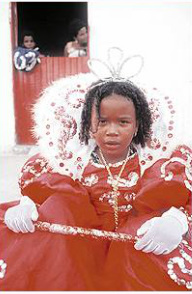
It is therefore trusted that the Chief of Police will take the necessary measures in order to put an end to any similar meetings, vulgarly called maracatus, thus putting an end to the unpleasant consequences that they provoke. In Recife, from the first half of the 19th. century, the denomination maracatu was used to describe any grouping together of negroes, as noted by José Antônio Gonsalves de Mello in the Diario de Pernambuco of 1st July,1845, when referring to the escape of the slave girl Catarina: On Easter Monday, in the year just passed, the black slave girl Catarina, escaped. She was from the Angolan nation, civilized, tall, thin, small breasts, very black, a pleasant face, big red eyes, all her front teeth, big feet pointing inwards, a great talker, always smiling and 22 years old. She had been found on the intersection of the roads Estrada da Nova da Passagem da Madalena and Aterro dos Afogados, selling vegetables. On Sundays, she was to be found taking part in the maracatu dos coqueiros (The coconut palms maracatu) in the same region. It is believed that her rightful place is in Várzea (a district of Recife) and that indeed she is the slave property of Manoel Francisco da Silva, who resides at 10, Rua Estreita do Rosário, on the third floor, just by the church. The said Manoel Francisco da Silva, will generously reward anyone who can return her to him.
Maracatu, in truth, was merely the negroes’ batuque1, which had a fixed meeting place in a determined district of the city. This conclusion is reinforced by carnival artistic designer João Batista de Jesus, “Veludinho” (Little velvet) of the Leão Coroado Maracatu (The Crowned Lion Maracatu), who, according to tradition died at 110, and related to the researcher Katarina Real2 in January 1966 that – “Maracatu did not originally have the name maracatu. The name was nation. One ‘nation’ would send official correspondence to another ‘state’. The word originated from the ‘big men’ …….when they heard the big drums beating, they called it ‘that maracatu‘ – that damned racket.”
1 Generic designation for Afro-Brazilian dances and music. In the past it was sometimes used disparagingly.
2 REAL, Katarina. O Folclore no Carnaval do Recife. (Folklore in the Carnival of Recife) Recife: Editora Massangana, 1990. 2ªed. p. 184.
3 The female leaders of the African religions.
Maracatu, in truth, was merely the negroes’ batuque1, which had a fixed meeting place in a determined district of the city. This conclusion is reinforced by carnival artistic designer João Batista de Jesus, “Veludinho” (Little velvet) of the Leão Coroado Maracatu (The Crowned Lion Maracatu), who, according to tradition died at 110, and related to the researcher Katarina Real2 in January 1966 that – “Maracatu did not originally have the name maracatu. The name was nation. One ‘nation’ would send official correspondence to another ‘state’. The word originated from the ‘big men’ …….when they heard the big drums beating, they called it ‘that maracatu‘ – that damned racket.”
1 Generic designation for Afro-Brazilian dances and music. In the past it was sometimes used disparagingly.
2 REAL, Katarina. O Folclore no Carnaval do Recife. (Folklore in the Carnival of Recife) Recife: Editora Massangana, 1990. 2ªed. p. 184.
3 The female leaders of the African religions.


